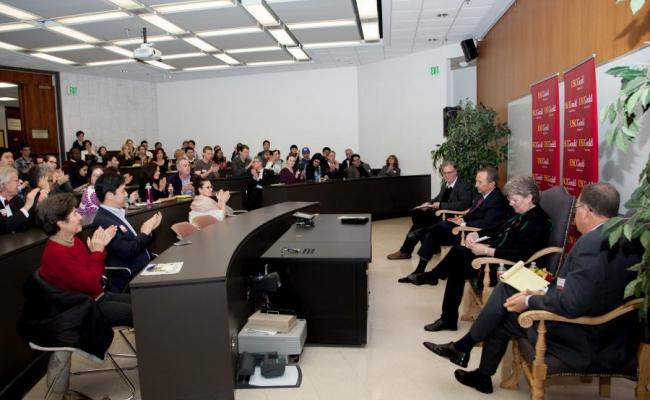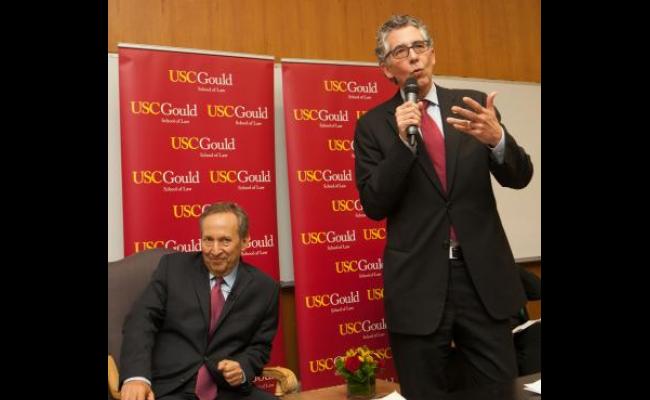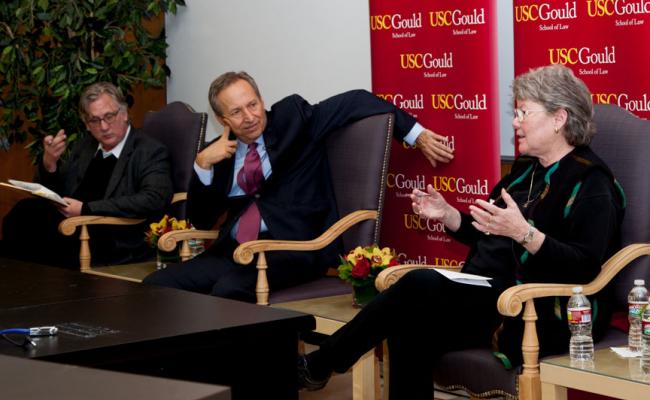Friday, Feb 15, 2013
Larry Summers Delivers Tax Conference Keynote Address
By Maria Iacobo
Photos by Mikel Healey
Should the U.S. government raise taxes on things that society as a whole discourages (think: alcohol consumption, sugary soda pop, highway travel) as a means of increasing our tax coffers?
Larry Summers, the lauded economist, civil servant and academician, believes this is an under-explored area of study and one that academics should quickly undertake and investigate.
He also suggested that there has not been enough study on the merits or demerits of taxing things that society has actively discouraged over the years, such as the production of carbon dioxide emissions and the consumption of products like tobacco, sugar and alcohol.Summers said he believed broadening the base and lowering the rates is on balance “the right thing to do” as part of his third observation.Summers delivered the keynote address at a recent conference recognizing the 100th anniversary of the passage of the 16th Amendment and kept a lecture hall filled with students, faculty and alumni captivated for an hour of tax talk. The conference was organized by USC Gould’s tax faculty and drew tax scholars from around the country.
Summers delivered five observations he finds “very important” as the federal government examines the future of our tax code.
His first observation identified four forces that he expects will weigh heavily on the decisions of any political party at the helm and will lead to a dire need for increased revenue. The first force is that, as a society, we are getting older.
“By any definition of retirement age, a fraction of those who are retired to a fraction of those who are working will be 50 percent higher in 2030 than it has so far in this century,” Summer said. “That means that as a share of all the income that is earned, the cost of [government] programs will be substantially greater than it has been historically.”
The second force is the growing size of our debt. We have twice as much debt, which means twice as much of an interest burden; the third force is the structure of our economy— “relative prices are changing in ways that pressure the size of government.”
The final force is that the unequal distribution of wealth in the U.S. will increase.
“Government is involved in activities related to the redistribution and the provision of social insurance, and we are becoming more unequal as a society. The top one percent of our population now earns about 25 percent of all the income; it used to earn about 10 percent of all the income. In the 1960s, one out of 20 men between the ages of 25 and 54 was not working. When the economy is fully recovered from this recession, it will be one out of seven men between the ages of 25 and 54 who will not be working.”
Summers’ second observation is that income tax will be “profoundly challenged by the increasing perfection of capital markets and the increasingly effective liquification of a broad range of transactions…. There are vast amounts of income that are escaping taxation.”
“There seems to me to be a variety of activities on which there is a very substantial social case for active government measures to bring about reductions and that the use of price instruments would have the virtue of generating revenue,” Summer said.
In Summers’ final observation, he predicted that the one area of tax law that will change fundamentally over the next 25 years is its international and global scope.
“I think the viability of corporate tax reform hinges on being able to do something constructive that is both revenue raising and business friendly in the corporate international area,” Summers said. “If you can’t do that, and it’s only about lower rates and less accelerated depreciation and fewer incentives for [research and development], everything I know from my political experience suggests that the beneficiaries of the lower corporate tax rates will neither be as enthusiastic nor as noisy as the losers from the base broadening measures and it will be very difficult to put together an appropriate political coalition.




